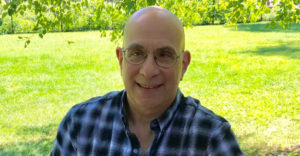
Years at LGA: 17
What do you love about teaching at LGA?
I love the camaraderie among faculty/staff here, which I think extends to communal camaraderie including students and families. It really feels like home here. This makes a difference in the classroom, where students and teachers learn together, because we can relate with each other in such a well-rounded way.
What is your favorite topic/subject to teach and why?
I particularly enjoy helping students develop their critical thinking skills, which is inherent in the study of Jewish text, history, and even drama. I enjoy watching kids grow in their ability to identify, analyze, and communicate about increasingly sophisticated ideas, and it’s also gratifying to know that this is a cognitive and social skill set that will serve them well in every area of life.
What are your favorite activities that you do with students?
I especially enjoy accompanying our fifth grade classes to Boston on a Thursday late in the year, to learn and enjoy while exploring Boston, and then spending the night at the Museum of Science.
I also really enjoy intergenerational activities we’ve done for the past half decade at local senior communities, where LGA kids and seniors get to know each other as friends and fellow community members, while doing book discussions, playing games, and chatting about all kinds of things.
What benefits do you see from our dual curriculum?
I think the Language Arts, Social Studies, and Jewish text study curricula all work together to enable LGA kids to become skilled readers, skilled thinkers, and articulate communicators of the ideas they’re grappling with. The daily, consistent study of and use of Hebrew language help LGA students to develop second-language learning skills they’ll make good use of in secondary school and beyond.
How do your students change between the beginning and the end of the year?
They move to the next stage in growth as a person. Of course this means making a year’s growth in academic skill and knowledge, but just as importantly (or maybe more) they make a year’s growth as a person, building on personal strengths and addressing challenges, learning more about themselves and those around them.
Even if they become more ‘grown-up,’ they do all seem to maintain their enjoyment of play and fun. I have fond memories of having intense discussions before recess about Ecclesiastes with sixth-graders, who promptly make a bee-line for the swings when the clock strikes 11.

Copyright © 2024 Lander-Grinspoon Academy. All rights reserved. Website designed by Addicott Web.